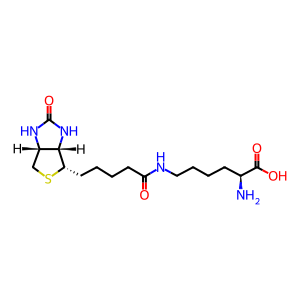Reaction: Defective extracellular BTD does not hydrolyse BCTN
- in pathway: Defective BTD causes biotidinase deficiency
Human biotinidase (BTD, EC 3.5.1.12) (Cole et al. 1994) catalyzes the hydrolysis of biocytin (BCTN, aka biotinyl-lysine), a product of biotin dependent carboxylase degradation, to biotin (Btn) and lysine. The process results in the regeneration of free Btn, an essential coenzyme for 5 carboxylases necessary for normal metabolism in humans. BTD is both secreted from various cells and localised in the mitochondria (Wolf & Jensen 2005). BTD deficiency, an autosomal recessive disorder, results in a secondary Btn deficiency that leads to juvenile onset multiple carboxylase deficiency (MIM:253260) (Wolf et al. 1983). More than 165 mutations in BTD have been reported (Procter et al. 2013, Pomponio et al. 1995, Pomponio et al. 1996, Wolf et al. 1997, Pomponio et al. 2000) and are catalogued in the BTD database (www.arup.utah.edu/database/BTD/BTD_welcome.php ).
Reaction - small molecule participants:
BCTN [extracellular region]
Reactome.org reaction link: R-HSA-3325540
======
Reaction input - small molecules:
biocytin
Reaction output - small molecules:
Reactome.org link: R-HSA-3325540

